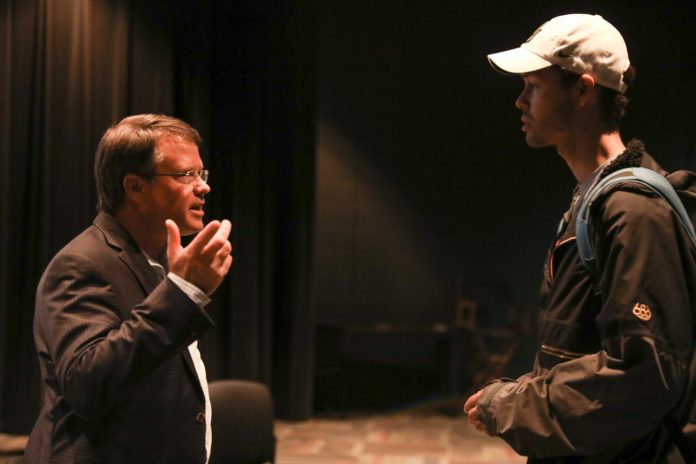
By Caroline Yablon | Reporter
According to Chris Talley, chief communications officer of USAA –– a Fortune 100 company, a student can get experience without even interning. Talley, a Baylor alumnus, gave advice to students Thursday evening in Castellaw Communications Center. The speech was hosted by Public Relations Student Society of America.
Some advice Talley gave to the students was for them to take advantage of “student privilege,” which is a student using their title to reach out to companies or a person for advice; block out time to plan for life after Baylor; and leverage the Baylor family.
Talley said most students know for the most part what they would like to do after college, and there are only a handful of those jobs out there that many of them would like to have.
“If you’re a student at Baylor University, you have the privilege to call anyone, write anyone or text anyone in the country and say, ‘I am a student studying journalism at Baylor University, and I’m interested in X. Can I come in and buy you a cup of coffee?’” Talley said.
He said chances are that person will say yes because a student is not asking for a job, but instead asking for someone’s opinion and advice, and that is a privilege that a student has only while in college.
He told students to not only block time to study, but also block time every day to focus on what they want to do after Baylor.
Talley recommended students spend at least 30 minutes to an hour each day planning their path after college. He said it is a form of health, physical and mental security to devote that amount of time on your future because it can help prevent a student from looking for a job after they have already graduated.
New Braunfels junior Kaitlyn Anderson asked Talley what it looks like for a student to devote time to networking and planning.
He advised students to have an idea of where they would like to live and what kind of work they are interested in. However, he said students should not be picky at first — they should take the work they can get.
“Create opportunities and when you have the offer, then decide if it’s a good fit for you,” Talley said.
He feels so strongly about this tactic that he doesn’t see the harm in a student’s giving up a letter grade in a class if it means spending more time networking and researching where they would like to be after college.
“Never have I ever had one person ask me what my GPA was here — that’s not the profession we are in [communications]. We’re not engineers and were not data scientists; those folks get recruited, [and] those recruiters come to campus and ask what their GPA is,” Talley said.
Dr. Marlene Neill, assistant professor for Baylor’s department of journalism, public relations & new media, said students pursuing a career in public relations really have to make some tough decisions about how they balance their time because in the field of public relations it is critical that students complete internships so they gain experience in the field.
“When I was a student, I had to work about 15 to 20 hours per week and also complete an internship as part of the requirements for my capstone course that last semester,” Neill said. “Those short-time sacrifices will pay off in the long term. So yes, students should make time to get involved with professional organizations like PRSSA. Yes, they need to make time for job searches and networking, and at the same time, do their best to keep up in their courses.”
Since journalism students don’t get recruited as many business students do, Talley said the ball is reversed, and public relations and communication students have to go out and recruit for themselves.
“We have to create our own opportunities, and the great news is the profession of communications and the art of communications does apply to every single thing in the country and the world. Whether that’s the church, a nonprofit, a corporation, PR agency, a school within a school, everybody needs communications. So there’s arguably one of the most available jobs in the world — just doesn’t feel that way when you get started looking,” Talley said.
A way for students to start connecting with professionals in the field of public relations is through joining PRSSA. The Baylor chapter is still accepting membership applications through Thursday.
Talley said students should take advantage of their professors and friends’ family connections because they have parents, neighbors and friends from church who may be in the field or area of studies they are interested in pursuing.
“When I was here we didn’t have LinkedIn, so I had a piece of paper, and I had names on the left, and if I made a connection through Dr. Sara Stone, I wrote down the names of the people I met through Dr. Stone and started my own manual version of LinkedIn, and that’s how you kept in touch,” Talley said.
Talley said there’s nothing different in the art of communication or the profession of public relations today then there was been since the beginning — it’s just a little easier with the platform in place today.





